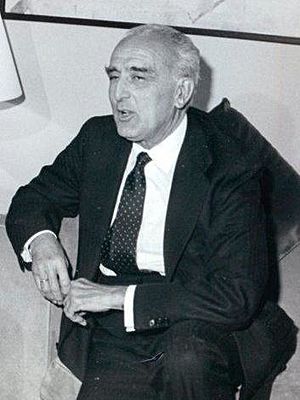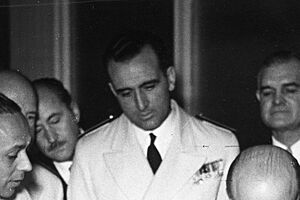Joaquín Ruiz-Giménez facts for kids
Joaquín Ruiz-Giménez Cortés (born in Hoyo de Manzanares, Madrid, on August 2, 1913 – died in Madrid on August 27, 2009) was an important Spanish politician and lawyer. He served as the Minister of Education under Franco from 1951 to 1955. However, he later disagreed with Franco's government and began to support a peaceful move towards democracy. He did this especially through a magazine called Cuadernos para el Diálogo. He was seen as a key figure among those who quietly opposed Franco's rule. Although he didn't play a big part in the first democratic elections in 1977, he later became the first Spanish Ombudsman, a public official who protects people's rights.
Contents
Biography
Early Life and Education
Joaquín Ruiz-Giménez was the son of Joaquín Ruiz Jiménez, who was also a politician. His father was a minister twice and even the mayor of Madrid. While studying at the University of Madrid, Joaquín was very active in Catholic student groups. In 1935, he became the secretary-general of the National Catholic Students Confederation.
When the Spanish Civil War began, he was arrested several times. He eventually found safety at the Panamanian embassy and was moved to Marseilles. After that, he joined the Nationalist Army and fought in different areas like Segovia and Teruel.
After the war, he earned degrees in Arts and Law. He became a councilor in the Madrid city council and a Law professor at the University of Madrid. From 1939 to 1946, he was the president of the Pax Romana organization, which is a group for Catholic students and professionals. He also helped write the Fuero de los Españoles, which was like a list of rights for Spanish people, created by Franco in 1945. Later, he was made director of the Hispanic Culture Institute (1946-1948) and then ambassador to the Holy See (1948-1951). There, he helped create the 1953 Concordat, which was an agreement with the Pope.
From Minister to Opponent of Franco
In 1951, Franco appointed Joaquín Ruiz-Giménez as the Minister of National Education. In this role, he set up a special group to help teachers and scholars who had been unfairly removed from their jobs by Franco's government. Over time, his political views became more aligned with Christian Democracy. This is a political idea that combines Christian values with democratic principles.
In 1956, he had a disagreement with the Minister of Interior about student protests. Because of this, he was removed from his position. Franco then appointed him as a National Counselor in the Parliament. However, he resigned from this job in 1965.
In 1963, he started a political and cultural magazine called Cuadernos para el Diálogo (Notebooks for Dialogue). This magazine became very important in Spain during the 1960s and 1970s. It was a place where people could discuss how Spain could become more open, democratic, and connected to Europe. Cuadernos para el Diálogo was one of the most daring publications allowed under Franco's rule. Ruiz-Giménez himself was seen as a leader of the left-leaning Christian Democrats in Spain.
In June 1975, he joined a secret group called the Democratic Convergence Platform. This group brought together many organizations that opposed Franco, including Social Democrats and Communists. However, Christian Democracy did not do well in the first democratic elections in 1977. Most of their political space was taken by Suárez's party, the UCD. Ruiz-Giménez's party, Democratic Left, joined a coalition that received only 1 percent of the votes and then broke apart.
First Spanish Ombudsman
After stepping back from direct politics, Joaquín Ruiz-Giménez was chosen to be the first Spanish Ombudsman from 1982 to 1987. An Ombudsman is a public official who investigates complaints from citizens against the government or public organizations. They help protect people's rights.
In his later years, he was highly respected by people from all political views. He became involved in several groups that help people and protect human rights. He led the Spanish Committee of UNICEF (1989-2001) and was vice-president of the Spanish Commission of Relief to Refugees. He received many awards for his work helping others.
See also
In Spanish: Joaquín Ruiz-Giménez para niños
 | Calvin Brent |
 | Walter T. Bailey |
 | Martha Cassell Thompson |
 | Alberta Jeannette Cassell |



